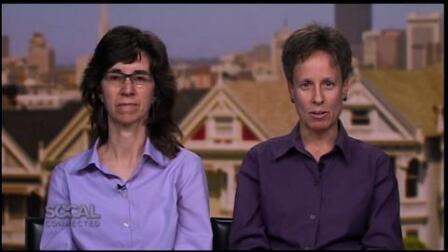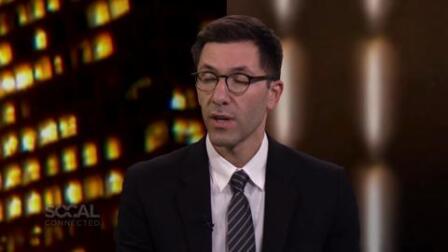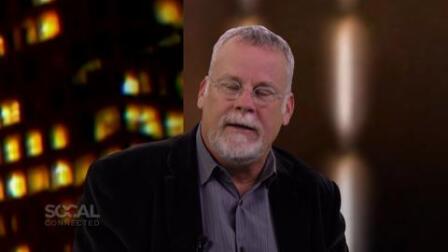
Fracking Still Unregulated Despite Quake Connection
Californians understand two big challenges very well. First, we need more energy. Second, we live in earthquake country. But what if solving the first increased the danger of the second? The controversial drilling method called "fracking" could potentially open up vast new supplies of oil and gas, but some believe it could also open up the earth. Since we first reported on fracking, a few things have happened. A well-known filmmaker has taken up the cause, and regulation of fracking is still nowhere to be found.
Transcript:
Jennifer London/Reporter: In Oklahoma , Arkansas, and in Ohio, earthquakes shake the ground and rattle nerves. But these quakes are not the work of mother nature. The USGS says a controversial oil production method called "fracking" is responsible for triggering them.
And here in California, where we live under the constant threat of a tremor, you may be surprised to learn that fracking is happening here, too.
Fracking is a drilling method where highly pressurized water, sand, and a cocktail of chemicals are injected miles into the ground to shatter the rock, which allows the oil and gas to escape. A critical part of this process is getting rid of millions of gallons of waste water. A common way to do that is to re-inject it back into the earth. And that's what can trigger an earthquake.
Dr. Lucy Jones: So where they've been disposing of waste water by pumping it down below the water table, that gets you down to the seismagenic depths, and that seems to be where we see the earthquakes.
London: Dr. Lucy Jones is a seismologist with the USGS in Pasadena.
Jones: Well, an induced earthquake is an earthquake, and every earthquake makes another earthquake more likely.
Josh Fox/Filmmaker: Listen, this is crazy! I really think it's bonkers to be proposing to frack in Downtown Los Angeles -- not downtown -- in Baldwin Hills in Los Angeles, on the fault line.
London: Josh Fox has made exposing fracking his life's work. In his Oscar-nominated documentary, "Gasland," he helped bring this controversial drilling method out of the shadows and into people's homes. Fox has now turned his attention to the link between fracking and earthquakes.
And you can't study earthquakes without coming to California. In May, Fox visited Inglewood, home of the nation's largest urban oil field, which sits atop the Newport-Inglewood fault.
Fox: They were fracking in Baldwin Hills, there were injection wells in Baldwin Hills, and my jaw was on the floor.
London: The neighborhood of Baldwin Hills and the Inglewood oil field were also the focus of our "SoCal Connected" investigation last March. Residents say since PXP took over the oil field, the company has drilled new, larger wells and also increased drilling operations.
Homeowner: It more or less started up more in the last six years when they increased production.
London: We spoke with residents who have been dealing with major structural damage to their homes. Like this one with huge cracks in the foundation. The homeowners say the damage was caused by increased oil drilling nearby. Add fracking and its waste water disposal to the mix, and there's plenty of anger rising to the surface.
Resident [at meeting]: We don't want to be your guinea pigs! And if you think we're going to allow you to destroy our property, our family members, and our health, you're not smart.
London: These residents are scared. They worry about the potential for man-made earthquakes. The Newport-Inglewood fault runs right under their homes.
Resident [at meeting]: Are you going to have insurance that's valid so if all your studies and all the things you've told us here, if it doesn't pan out, then we can sue you?
London: These questions were directed at PXP, the oil company operating in Inglewood. At a recent community meeting, representatives and their consultants presented the results of their frack tests which, among other things, looked at induced seismic activity.
PXP Spokesperson [at meeting]: Each of these dots is microseismic events that were measured in one of those three wells that were located near the two that we actually did hydraulic fracturing on.
London: PXP says those micro-earthquakes are too small to feel, and says fracking poses no danger in Inglewood. But because PXP paid for the study residents remain suspicious.
And it's not just the highly populated Baldwin Hills area that's a concern. East of Los Angeles, the Whittier fault line is also blanketed by dozens of housing developments and shopping malls and oil fields.
See this oil rig? No big deal, right? But what you can't see is the Whittier fault line that runs underneath -- an active drilling site where fracking and the re-injection of waste water may occur. Plus an active fault line is the perfect combination to trigger an earthquake.
News footage taken back in 1987, when a major natural quake struck the area, tells a terrifying tale of just how active this fault line is. The 5.9 tremor left eight people dead, and caused hundreds of millions of dollars in damage.
That quake was not caused by fracking, and industry reps maintain it's a safe and effective process. But for critics, like filmmaker Josh Fox, it does raise the question:
If an area is already prone to deadly earthquakes, and we know the re-injection of fracking waste water can cause a quake, do we really want fracking going on anywhere near active fault lines?
Fox: It is absolute insanity to me to think that you would put a peril to that city for a few extra dollars for the oil and gas industry. But this is the way it works.
London: And then there's the question of who is monitoring fracking operations in the state? The short answer: no one. Our earlier investigation uncovered that fracking is not, and has not, been regulated in California.
London: Do we know how many wells have been fracked? Or how many wells are currently being fracked?
Tim Kustic/DOGGR: No, we don't have hard data on the number of wells being fracked in the state.
London: Tim Kustic is in charge of the Division of Oil, Gas and Geothermal Resources, better known as DOGGR. It is the state agency in charge of regulating the oil and gas industry. As part of our investigation last March, we sat down for an exclusive, one-on-one interview with Kustic.
Kustic: Since there is no requirement to have a specific permit to frack a well, the division therefore does not track individual frack jobs. So, we can't tell you for sure how many wells in the state have been fracked because at this time there isn't a permitting requirement.
London: The division is the regulatory agency; can't you change the regulations and say, "We are now going to require a permit for a frack job?"
Kustic: We certainly can, and we are studying that issue.
London: A few days after our story aired last spring, the division put out this notice to oil companies "strongly encouraging all operators to report their fracking operations."
London: So, Tim, as supervisor of the division, you don't have the authority to go to the Department of Conservation and the governor and say, "Look, I think we need to be more transparent about fracking." You don't have the authority to do that?
Kustic: I do have that authority. But as I said, since the legislature is already pursuing that, I have a lot of other things on my plate I would prefer --
London: So it's not a priority for you?
Kustic: It is a priority, but I already see government moving towards a solution.
London: Not anymore. Kustic was counting on a piece of legislation which would have required DOGGR to actively regulate the oil and gas industry. But the bill was killed in committee.
So the ball has been tossed back to DOGGR, which has little choice but to now draft fracking regulations on its own.
No one from the division agreed to be interviewed for this story. But in an email, a DOGGR spokesperson wrote that because they don't track fracked wells, they can't track when waste water is being re-injected either.
Filmmaker Josh Fox says that's unacceptable and believes there is only one course of action.
London: Vermont becomes the first state to outright ban fracking. Do you think California should do the same?
Fox: We should be banning fracking all across the United States. When you have a direct relationship that says fracking and waste water injection causes earthquakes, I think you'd have to follow the science.
London: Banning fracking isn't likely to happen anytime soon in California, which is one of the reasons the USGS is planning on studying the issue further.
Jones: What we want to do is try to understand better how, in places where we know they're being induced, how does it, how do the earthquakes track with the pumping records.
London: Obtaining that kind of information will require cooperation from the oil companies.
Jones: What we're going to be doing is trying to get the data about what pumping has gone on. And just to do a time series analysis and compare when we've had earthquakes versus when the pumping is. If the pumping isn't tracked, we won't be able to do it.
London: Which means Californians are left waiting and wondering -- waiting for the regulators to regulate, and wondering if the next earthquake that strikes could have been avoided in the first place.
For "SoCal Connected," I'm Jennifer London.











